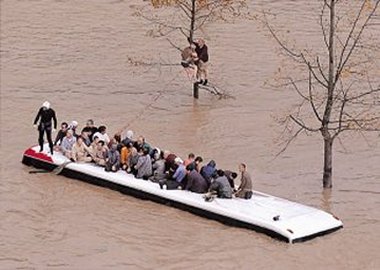|
The registration form
NSK News Bulletin Online
December 2004 -------------------------------------------------------------------
*Topics --Press Photographers' Associations Announce 2003 Awards - - - - - - - - - - - - - - - - - - - - - - - - - - - - - - - - - - - - - - Story of the Month>>> Top Writers Debate the Issues ------------------------------------------------------------------- The Delegation of the European Commission in Japan on Oct. 29 submitted its annual "EU Priority Proposals" for regulatory reforms to the Japanese Foreign Ministry. The latest report is noteworthy for finally dropping the demand for the abolition of the Japanese kisha club(Press club) system that it had made in its reports submitted in 2002 and 2003. The Nihon Shinbun Kyokai (NSK) had responded to the previous demands by urging all kisha clubs to permit duly accredited reporters from foreign media to attend official news conferences. NSK argued that such action would eliminate the grounds for the EU complaint against the kisha clubs. The EU delegation had previously maintained that Japan°«s press club system hindered newsgathering by foreign media and restricted free trade in information between Japan and Europe in a way that had broad negative consequences for domestic and international consumers of information about Japan. The EU had demanded that all foreign correspondents holding Japanese Ministry of Foreign Affairs press cards be allowed to attend official media events on an equal footing with domestic journalists and said that Japan's press club system had to be abolished to remove restrictions on the free trade of information. Prompted by the EU demand, NSK assigned the matter to a press-club issues subcommittee of its Editorial Affairs Committee in October 2002. In December 2003, NSK issued an official response, arguing that the kisha club system functioned effectively as an institution to ensure the public's right to know and that there was absolutely no need to abolish it. In March 2004, NSK called on all press clubs to permit reporters with Foreign Ministry press cards to attend official news conferences. At the same time, the Foreign Ministry asked media relations officials at government agencies and ministries to facilitate the attendance of such journalists at all official news conferences. The EU eventually indicated that it was not necessarily demanding the abolition of the press club system, but was calling for changes in its operations to allow foreign media access. The EU also hinted some time ago that it might drop its abolition demand if NSK's calls for greater access produced tangible results. The lack of any demand about the kisha club system in this year's EU report is being greeted by NSK as a sign of the success of its alternate solution.
The Supreme Court on Nov. 25 dismissed a 58-year-old woman's lawsuit against NHK, reversing a lower court ruling that had ordered NHK to air a correction to a 1996 program that referred to her divorce. But the top court did uphold an order that NHK compensate the woman for damages caused by defamation. The Supreme Court ruled that the woman did not have any statutory civil right to demand that a correction be broadcast. It thereby reversed a July 2001 Tokyo High Court ruling. However, the top court did uphold the woman°«s claim for damages due to defamation and the infringement of her privacy, approving an order that NHK pay her 1.3 million yen in compensation. One day after the Supreme Court ruling, NHK broadcast an effective correction and apology as part of its report on the decision. The case resulted from a special NHK program aired on June 8, 1996 that featured the stories of husbands whose wives were presented as having unexpectedly told them they wanted divorces. The complainant's case was mentioned at the beginning of the program in a voice-over narration that alleged that she had suddenly, one morning, told her husband that she wanted a divorce. Her husband and son appeared on the program. The woman said the program's producers did not interview her and the program depicted the process of their divorce in an entirely one-sided manner. The woman sued, demanding that NHK pay her 4.1 million yen in compensation for defamation and air a correction of the story. The Tokyo District Court, in a November 1998 ruling, rejected the woman°«s claim. However, on appeal, the Tokyo High Court ruled that NHK should have either concealed the identity of the woman, her former husband and son, or should have made a real effort to present the facts fairly by contacting both sides. The high court ordered NHK to air a correction about its story. The Supreme Court ended up resolving a main point of dispute on how to interpret Clause 1 and Article 4 of the Broadcasting Law that obligates broadcasters to air corrections when a victim demands one over the broadcast of false information. The high court ruled that the law should be interpreted as giving a victim a statutory civil right to demand the broadcast of a correction. The Supreme Court ruled that the relevant clause of the Broadcasting Law aims to direct broadcasters to serve the public good and thereby promote the healthy development of broadcasting that is protected as a form of freedom of expression. It said that the clause in question obliges broadcasters to voluntarily air corrections as a public duty to ensure freedom of expression. Its ruling concluded that the clause that states that a victim can request the broadcast of a correction should be interpreted as a starting point for an investigation into the credibility of the information broadcast and then should lead to a decision on issuing a correction. In addition to her demand for the broadcast of a correction, the woman also demanded the broadcast of an apology under Article 723 of the Civil Code. However, the high court ruled that a payment of compensation in redress and the broadcast of a correction would be sufficient to restore the woman°«s honor. On the day of the Nov. 25 decision, an NHK spokesman said, "We consider our argument to have been accepted by the ruling in that it dismissed the demand for the broadcast of a correction. As for the issues of defamation and infringement of privacy, we recognize that our argument was not accepted, and we will study whether we to now voluntarily air a correction.°… The next day, an NHK announcer reporting the details of the top court decision devoted about five minutes of a broadcast to explain factual inaccuracies in NHK's original report about the woman and made an apology. The woman's lawyer said, °»The Supreme Court ruling denies her statutory civil right to demand the broadcast of a correction, citing a need to ensure the broadcaster°«s independence. It then argues that to protect a broadcaster°«s independence, criminal punishment is also undesirable. In sum, the court's ruling is tantamount to saying that the woman should have filed a criminal complaint instead of a civil action. We agree that restrictions on the freedom of expression should be avoided, but we are not satisfied with the top court's decision. We do appreciate NHK°«s voluntary airing of the correction. But NHK really should have confirmed the facts at the time of its original broadcast. Its correction, made nine years after the program, has come far too late.°…
|
||||||||||||||

